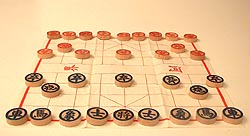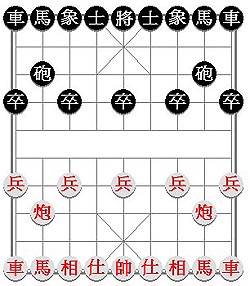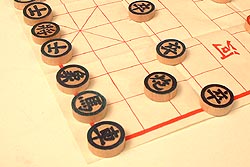An Illustrated History of Chess
Contents:
1 Origins
2 Early Chess
3 Thailand, Burma
4 China
5 From China?
6 Korea
7 Japan
8 Evolution
9 Europe
10 Variants
Exotic Chess
Products
The History
of Chess
How
To Play
Chess from
Around the World
An Illustrated History of Chess_________________4____
So...what's the long space in the middle of the board? That's the river. It's ignored by most of the pieces, but impassable by the elephant (or minister), and the pawn gains in power when it crosses into enemy territory. And what's the X on each side? A fortress to which the general or governor (the "king") is confined, with his advisors. (It makes him easier to get!) You can see that, cultural oddities aside, this game is a very slight deviation from the forms of chess we've already looked at. Now here's the big news: Chinese Chess is probably played by more human beings than any other board game in the world — including go (weiqi, "way-chee" in Chinese), and including our beloved western "international" chess. There are just so many Chinese people — and the game is so popular among them! But here's the big question: How are these games related, in the misty depths of antiquity? Read on... |
HOME
PAGE CHESS PRODUCTS: International | Asian | Reproductions | Unique | Rare | Other Games CHESS HISTORY PAGES: 1 | 2 | 3 | 4 | 5 | 6 | 7 | 8 | 9 | 10 HOW TO PLAY: Chess | Courier Chess | Sittuyin | Xiangqi | Shogi | Shatranj | Janggi Makruk | Shatar | Dou Shou Qi | Luzhanqi LINKS: Chess Variants | Chess History | Chess Articles | Mah Jongg AFFILIATED SITES: Rick Knowlton | Courier Chess | Knowlton Mosaics Ken Knowlton | Insite Age | VerySpecial.us CONTACT US |



